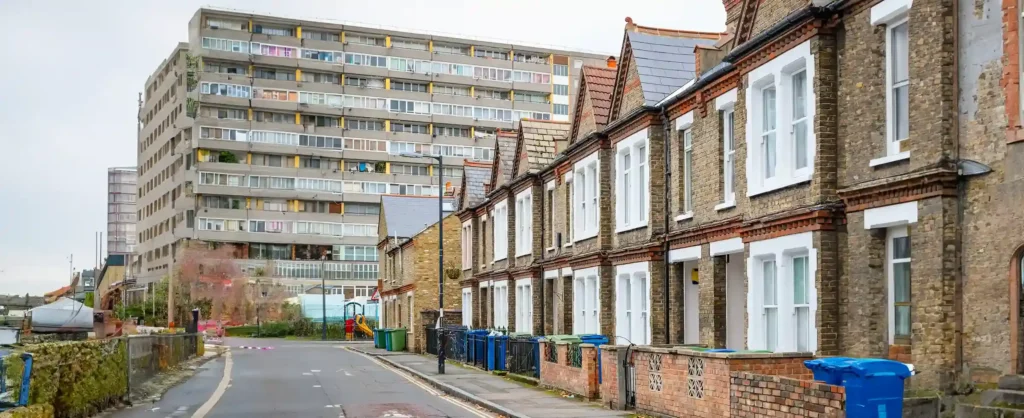2023 has been a year of economic turmoil for the UK, and renters may be experiencing the worst of it for a laundry list of reasons. With no end to the housing and cost of living crises, it may be time for stakeholders within the housing market to find ways to make the private rented sector more hospitable for renters.
In fact, with the recent article from BBC News revealing that even renters earning £30,000 a year are being denied access to London’s affordable rent schemes for not making enough income, I would argue that it’s now more important than ever for those who want to support a healthier and more sustainable rental sector to invest in more affordable properties and develop ways to better accommodate the needs of tenants.
While the upcoming Renter’s Reform Bill could offer tenants some comfort in the long term, the short-term demands of a financial crisis will require a more immediate and fast-acting response that goes beyond legislation.
Key Reasons Private Renters Need Housing Support
The private rented sector comprises over 4.6 million households, having doubled in size between the early 2000s and 2013-23 according to a 2022 survey by the Department for Levelling Up, Housing and Communities (DLUHC). The same survey also showed that the average private rented sector tenant has shifted from being largely made up of students and young professionals to a much older and more diverse segment of the population, including families, the elderly and those on low income.
These numbers alone suggest that housing affordability has become a driving force in the number of renters struggling through the current housing crisis. Gone are the days of private renters as industrious young graduates entering the working world and saving for their first homes: in major hubs like London, modern renters are instead living from paycheck to paycheck, struggling to keep up with the cost of living while resigning themselves to the idea of never owning property at all.
If it feels like I’m exaggerating, I’m sorry to say I’m not. Research by the Trust of London with Loughborough University shows that 4 in 10 Londoners are making less income than they need for a basic living, with a further 3.49 million households living inadequately.
Further findings from this report and a subsequent Trust for London report include the following:
- Single working-age adults in Inner London are paying 66% more to rent than the rest of the UK
- A single working adult in London must earn 30% more for a decent standard of living than in 2020
- 74% of Londoners with incomes below the minimum income standard are living in rented accommodation
- There are 41% fewer London rental properties available in 2023 than pre-pandemic
- Only 2.3% of properties on the market are affordable to those on housing benefits
Frankly, these findings paint a harsh picture of London’s private rental sector. It should come as no surprise, then, that the situation is not that much better outside of the nation’s capital. Various sources have revealed troubling data on the obstacles private renters are facing. Some highlights include:
- Private rental prices rising by 5.1% between June 2022 and 2023 across the UK (Office for National Statistics)
- The average cost of room rents across the UK rising by 17% in 2022 to exceed £700 a month for the first time on record (SpareRoom)
- Annual rental inflation for new lets rising by 4% year-on-year, with rents taking up the highest proportion of earnings in a decade at 28% (Zoopla)
- The number of renters who fell behind on rent payments doubling from 4% to 8% in the six months leading up to June 2023 (Zoopla)
There is no mystery here: the current state of the private rented sector is putting a significant number of renters in an unwinnable position and, with BBC News reporting that the average number of house viewing requests tripled since 2019 to reach 20 per home, the excessive demand for housing that is both affordable and accessible is only making matters worse across the board.
What Role Do Landlords Play in the Rental Crisis?
It’s easy to place the blame for the rental crisis and its impact on renters solely at the feet of landlords, but I believe the situation is much more complicated.
If you read our earlier article on how the mortgage crisis is affecting UK landlords, you may be familiar with some of the problems they’re contending with due to the cost of living crisis and high inflation rates.
According to Zoopla, the proportion of landlords returning to the housing market has dropped to 30%, suggesting that more homes are being lost from the rental market than new investments can make up for. Higher mortgage rates have also meant that 20-30% of landlords, especially those with the highest loan-to-value mortgages, have been forced to sell their properties as they near refinancing. The result of these financial stressors has been an increase in landlord sales in low-yield, high-expense areas like London and the South East.
Landlords have generally been shaken by the combined forces of the mortgage, housing and cost of living crises, with a survey recently conducted by SpareRoom revealing that only 45% of them still have confidence in the market. And, although their willingness to exit traditional properties is sound, the effect it has on renters cannot be overlooked.
Can Concept Capital Group Help Renters?
As the UK market leader in modular housing investments, Concept Capital Group can prioritise speed and affordability in building high-quality homes for vulnerable renters. Our business model is unique in its ability to provide a strong mutual benefit for our investors and their tenants, giving the former a consistent source of passive rental income and the latter a stable and secure home that stays protected from the market forces dominating traditional private rented properties.
Despite our current focus on vulnerable tenants, our products and services are constantly expanding to be more inclusive of renters from all walks of life, including those who are simply unable to keep up with the rental crisis and rising costs of living.
When you invest with us, you invest in the growth of the modular construction industry and its ability to alleviate the housing crisis using a revolutionary new approach to manufacturing and property investment that promotes equality with a compromise for modern landlords and renters.
To find out more about what we can do for renters, book a call with our team today.













